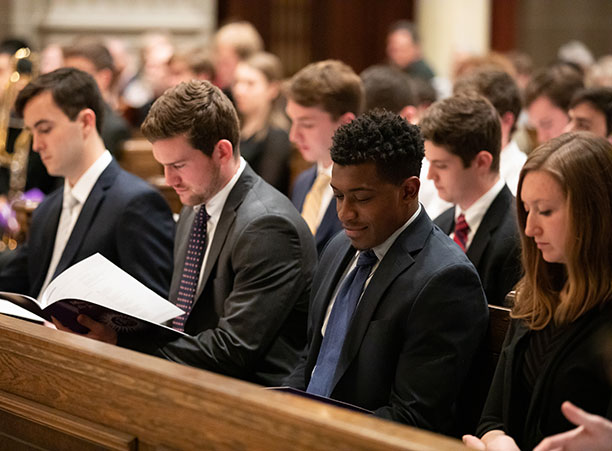Daina Harvey’s Food, Beer and the Environment class spent their summers doing.
“Most have never had a course on beer or food,” Harvey says. “So the first week is an orientation to the big questions: sociology of food, the ethics of our food, how much food we waste, factory farming, pollution and climate change.”
From there, they jump into topics as varied as lobster gangs in Maine, the industrial food system, local and organic farming, and craft breweries and wineries. And they even brewed some beer of their own in Kimball.
“There are social, cultural, economic and immigration issues that are bound up in what we eat and what we drink,” Harvey says. “Many of the students in this course are athletes and have an interest in food as fuel for their bodies, but I want them to have a deeper connection to where their food comes from and how things are made.”
The class is structured with a lecture at the beginning of the week on Monday, an event or activity on Wednesday (like brewing their own beer, or a service project), followed by a discussion on Friday.
The week that HCM visited Harvey’s class, Monday featured a lecture on how beer and wine — along with their accompanying breweries and wineries — are used to create a sense of place and belonging within a community. Wednesday they went off campus to volunteer at Community Harvest Project in Grafton, Massachusetts, a farm that provides produce to people in need. The farm relies on volunteers to harvest their fruit and vegetables, and on that Wednesday in late June, Harvey and his students assisted with weeding.
 Students help out at Community Harvest, a nonprofit farm in Grafton, Massachusetts, by weeding in the fields. Photo by Tom Rettig
Students help out at Community Harvest, a nonprofit farm in Grafton, Massachusetts, by weeding in the fields. Photo by Tom RettigHarvey also suggests that DIY culture played a role.
“That’s part of why we see those spaces, because people want to be near farms and items that get produced,” he says. “They want to be part of that process in some way, because it is different than being at a bar and just seeing the end product. People want to see the tanks at a brewery and the grapes at the winery, and then become part of the process.”
Harvey finished the lecture by discussing ways that craft breweries and wineries retain their sense of place when not all of their ingredients are locally sourced — playing up their connections to local farms and suppliers, partnering with other local breweries or wineries and emphasizing the nostalgia of the “do it yourself,” American Dream culture.
Course Catalog
SOCI-299: Food, Beer and the Environment
Department: Sociology
Description: Explore the relationship between food and beer in the environment, with a particular emphasis on New England. Students learn about the social relationships among producers of food and beer, food justice movements, cultural and ecological patterns inherent to foodways, socio-economic inequalities and the risks and sustainability issues inherent in our current food system, and also consider the social problems with the production and consumption of food and beer, including environmental degradation, labor injustices and unequal access to healthy food.
Meeting Times: Monday, Wednesday, Friday; 12 – 3 p.m.
Classroom: Beaven Hall, Room 113
Summer Session: This course was offered as part of a pilot six-week summer session in 2017.
Required Reading
- "Eating Animals" by Jonathan Safran Foer
- "The Mushroom at the End of the World: On the Possibility of Life in Capitalist Ruins" by Anna Lowenhaupt Tsing
- "The Lobster Gangs of Maine" by James M. Acheson
- "Organic Futures: Struggling for Sustainability on a Small Farm" by Brian Gareau and Connor J. Fitzmaurice
- "Local Vino: The Winery Boom in the Heartland" by James Pennell
- "Untapped: Exploring the Cultural Dimensions of Craft Beer" by Nathaniel G. Chapman
Vocabulary: Foodways = the cultural, social and economic practices relating to the production and consumption of food.
Assignments:
- Two papers
- Final exam
- Two discussion questions per week
- Discussion participation
Grades: Assignments, attendance and discussion participation
Prerequisites: None, open to all students
About the Professor
Daina Cheyenne Harvey is an assistant professor in the sociology and anthropology department, and also teaches environmental studies courses. He earned his Ph.D. in sociology from Rutgers University and has worked at the College for six years. He researches and teaches in the fields of social disruption, risk, climate, culture and cognition, suffering, urban marginality and the environmental precariat. His recent work has appeared in Urban Studies, Symbolic Interaction, Humanity and Society, Local Environment and Sociological Forum. Read more about Professor Harvey.
Written by Maura Sullivan Hill for the Fall 2017 issue of Holy Cross Magazine.
About Holy Cross Magazine
Holy Cross Magazine (HCM) is the quarterly alumni publication of the College of the Holy Cross. The award-winning publication is mailed to alumni and friends of the College and includes intriguing profiles, make-you-think features, alumni news, exclusive photos and more. Visit magazine.holycross.edu/about to contact HCM, submit alumni class notes, milestones, or letters to the editor.